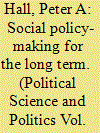| Srl | Item |
| 1 |
ID:
167618


|
|
|
|
|
| Summary/Abstract |
We describe the rise of “opportunity markets” that allow well-off parents to buy opportunity for their children. Although parents cannot directly buy a middle-class outcome for their children, they can buy opportunity indirectly through advantaged access to the schools, neighborhoods, and information that create merit and raise the probability of a middle-class outcome. The rise of opportunity markets happened so gradually that the country has seemingly forgotten that opportunity was not always sold on the market. If the United States were to recommit to equalizing opportunities, this could be pursued by dismantling opportunity markets, by providing low-income parents with the means to participate in them, or by allocating educational opportunities via separate competitions among parents of similar means. The latter approach, which we focus upon here, would not require mobilizing support for a massive redistributive project.
|
|
|
|
|
|
|
|
|
|
|
|
|
|
|
|
| 2 |
ID:
140217


|
|
|
|
|
| Summary/Abstract |
Dismantling the Welfare State is a classic work, as fresh and stimulating today as when it was fi rst written. Many of the insights in it are central to the study of policy making today. One is the core thesis, stated on the opening page, that “retrenchment is a distinctive and difficult political enterprise…in no sense a simple mirror image of welfare state expansion.” Paul Pierson was the fi rst scholar to show that theories about how welfare states were built are inadequate for understanding the politics of how they were sustained or reformed in the context of lower growth rates during the 1980s and 1990s. For that purpose, we need a new analysis of the “politics of retrenchment” that the book provides.
|
|
|
|
|
|
|
|
|
|
|
|
|
|
|
|